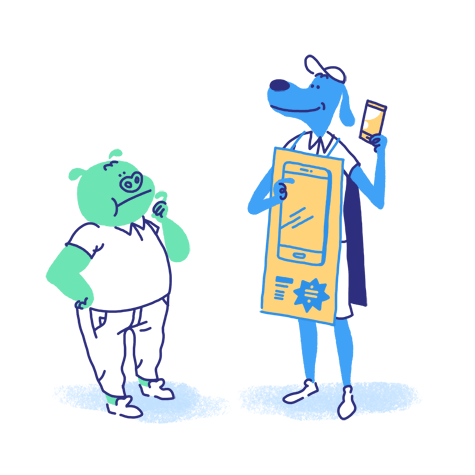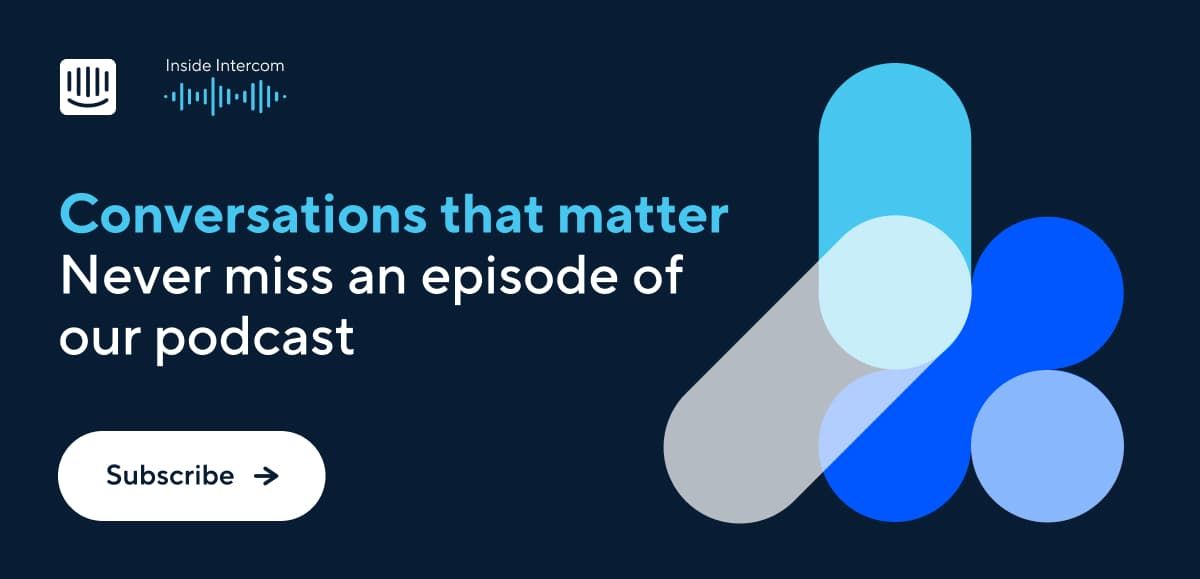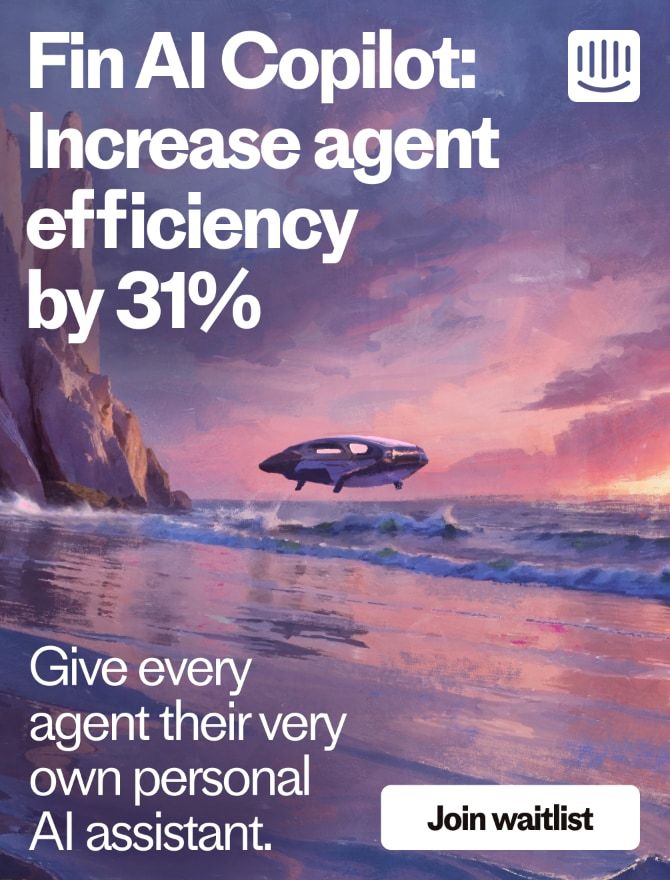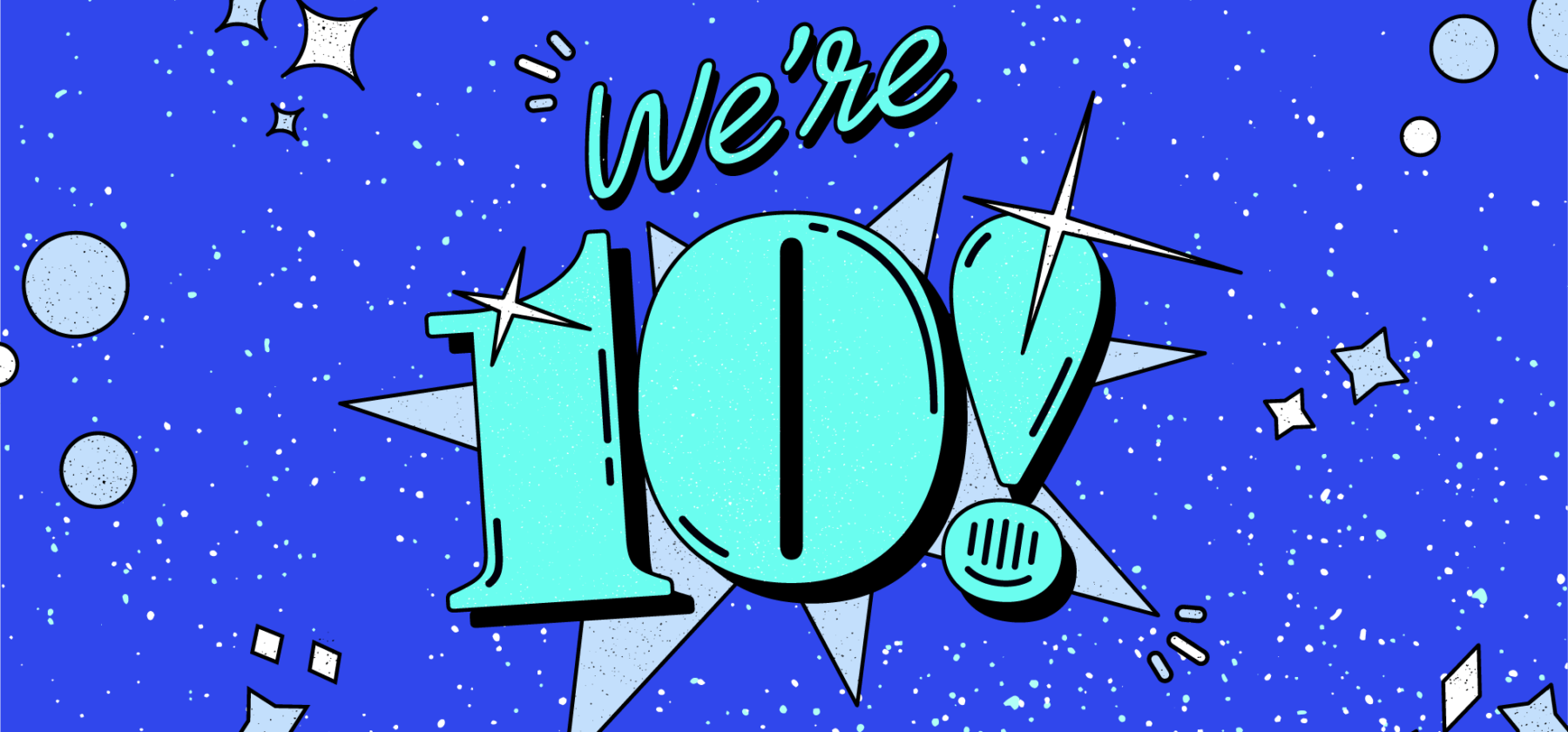
A decade in the making: An oral history of Intercom’s first 10 years
Main illustration: Jason Yim
From an epiphany in a small Dublin coffee shop to a company of 700.
This month marks the 10th anniversary of Intercom. A decade ago, a small group of friends — our co-founders Eoghan McCabe, Des Traynor, David Barrett, and Ciaran Lee — realized that the impersonal, transactional way of doing online business just wasn’t cutting it for customers anymore.
Intercom was born out of a desire to make internet business personal. People wanted to actually connect with businesses, to receive more than spammy emails or vague, cookie-cutter answers that weren’t relevant to their needs. All these years later, it’s clear that people want that sense of connection – our explosive growth is proof of that.
Today, we’re marking the occasion with something a bit different – a special episode of Inside Intercom featuring Intercom CEO Karen Peacock, Co-founders Des Traynor and Ciaran Lee and some special guests as they reflect on the journey so far. Join us as we recall the initial aha moment, the early startup missteps, and the major milestones that have marked our first 10 years.
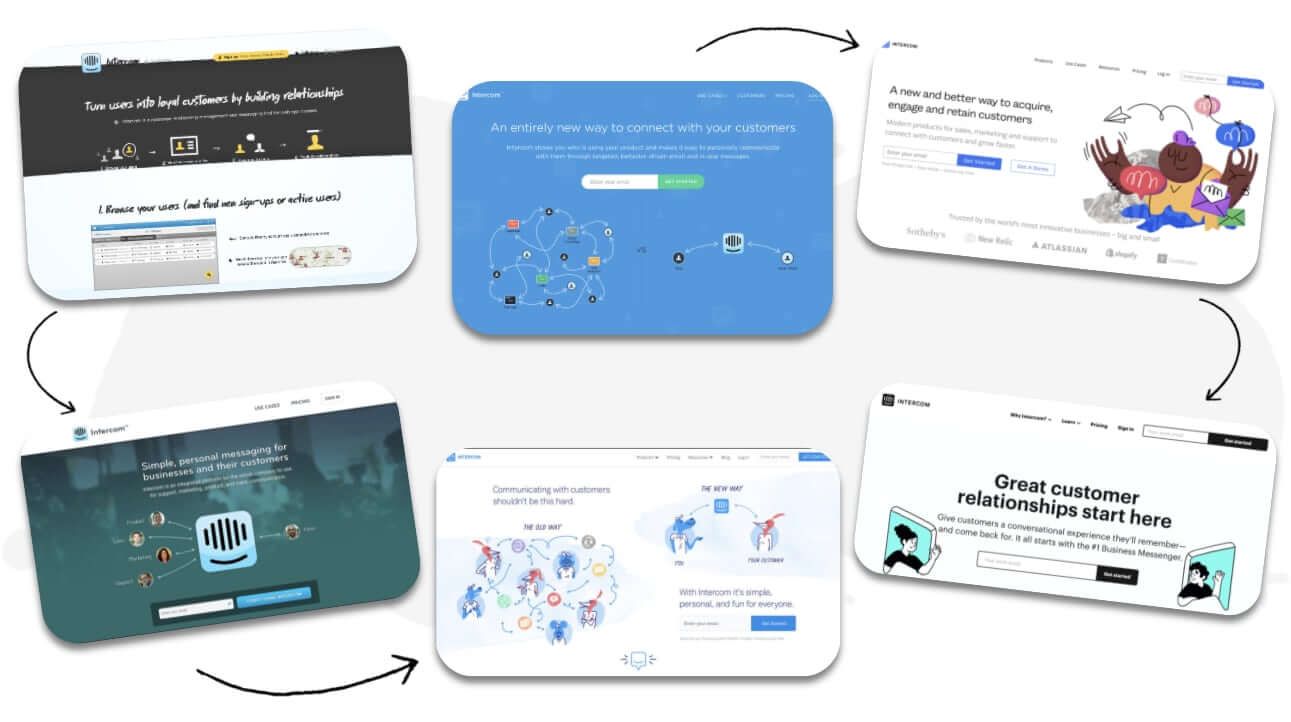
A collection of our homepages over the years
If you enjoy our discussion, check out more episodes of our podcast. You can subscribe on iTunes, stream on Spotify or grab the RSS feed in your player of choice. What follows is a lightly edited transcript of the episode.
Liam Geraghty: Hi there. I’m Liam Geraghty, and welcome to Inside Intercom. This week, we have something a little bit different for you. This month marks the 10th anniversary of Intercom.
Karen Peacock: So Intercom is and will be the modern customer communication platform.
Liam Geraghty: Intercom CEO Karen Peacock
Karen Peacock: We will be the primary way for companies to support their customers, to engage their customers, their prospects. And we want to be the place where every single team that touches customers can come together and interact and be the primary source and be able to do things that no one ever thought would be possible.
Liam Geraghty: How did Intercom get to this point? Well, today, our CEO, Karen Peacock, co-founders Des Traynor and Ciaran Lee, and some special guests share their memories of the past 10 years and what to expect in the future. If you enjoy today’s episode, make sure you don’t miss any upcoming episodes by following us on Apple Podcasts, Spotify, or wherever you’re listening to me now.
A revelation in the coffee shop
Liam Geraghty: So many stories of tech success begin in Silicon Valley. This one, however, begins in a small cafe in Dublin, Ireland.
Des Traynor: That’s correct. We were obsessed with lattes.
Liam Geraghty: Today Intercom has over 700 employees across five offices in San Francisco, Chicago, London, Sydney, and Dublin. But in 2011, Intercom was only a small group of friends, Eoghan McCabe, Ciaran Lee, David Barrett, and Des Traynor.
“We had customers that we wanted to talk to, and there were no good tools for talking to customers over the Internet”
Des Traynor: This better not end up like one of those NPR documentaries, where it’s like, “My name is Des Traynor and blah blah.””We caught up with Mr. Traynor in his home office.”
Liam Geraghty: I did, in fact, catch up with Intercom co-founder and chief strategy officer Des Traynor in his own home office. Virtually, anyway.
Des Traynor: We were working on the idea for Intercom to solve a problem with our previous products, which was that we had customers that we wanted to talk to, and there were no good tools for talking to customers over the Internet.
Liam Geraghty: For years, the phone, the Internet, and email had reigned supreme as the ways for people to connect with their customers. But as Intercom co-founder Eoghan McCabe said in a keynote address back in 2018, that reign was starting to sour.
Eoghan McCabe: Around 2010, near the end of the growth curve for the world wide web, connecting with businesses online as a consumer started to make for a pretty crappy, spammy, and transactional experience. The channel was over-optimized, maybe even dehumanized. It was rare, for example, that you could actually connect with a person, and it was pretty frequent that when you’d try, you’d receive that warm, fuzzy, delightful reply that sounded something like, “Dear valued customer, thanks for your inquiry. You are ticket number 5,053. Have you read our FAQ? Your ticket will automatically close in 10 days.”
Des Traynor: At the time, we were based in Dublin. For our previous product, the vast majority of our customers – I’m going to say 99.9% – were not, and we needed a better way to talk to them.
Liam Geraghty: While working out of 3Fe, a coffee shop run by Colin Harmon, they started to notice something.
Des Traynor: We observed how the founder of 3Fe, the coffee shop, was growing his business conversation by conversation, relationship by relationship, growing loyalty, encouraging repeat custom, creating what we would call today super-fans, if you like, and he did that just by human connection.
“All businesses ultimately depend on some form of loyalty”
Eoghan McCabe: We were running a different business at the time, another Internet company, and we had thousands of customers, but maybe met 20 of them, maybe 30.
Liam Geraghty: They had nothing like the relationship with their customers that Colin had with them. They started to ask themselves, was that kind of human connection even possible for online businesses?
Des Traynor: All businesses ultimately depend on some form of loyalty. The loyalty comes from the positive overall product experience, but also customer experience. We realized all businesses need a positive customer experience, and the tooling just wasn’t there. Businesses didn’t want to be impersonal. They didn’t want to be transactional. But the tools they had at the time were like email lists, data dumps from Google Analytics, PayPal exports of active subscribers. This was pre-Stripe, pre-anything, pre any good technology that we know today. Because of that, businesses were forced to be in many ways transactional. I know on the customer side, you didn’t get a great experience because you couldn’t just talk to the business. It was like, “Go to our Contact Us form. Here’s 27 drop-downs. Fill them all in, and if you’re lucky, we’ll tell you to go away in three to five working days or whatever.” We really wanted to do better, and that’s where the idea for Intercom was born.
Liam Geraghty: At the time, Des, Ciaran, Eoghan, and David had this business called Exceptional. It was an error-tracking app.
From the ground up
Ciaran Lee: Actually, the start of Intercom was a tiny feature that we built into Exceptional, our little error-tracking app.
Liam Geraghty: That’s Intercom co-founder Ciaran Lee. Ciaran says they had a problem with their software. Occasionally, they’d want to chat with their customers, but to do it, they’d have to jump through hoops – exporting, importing, wasting a bunch of time. They needed a solution.
Ciaran Lee: We had this idea. I don’t even remember who had it. It was probably Eoghan or Des. It definitely wasn’t me. We had this idea to sort of build part of the app where we could go in as admins in the backend, create a message, and our customers would see that message as they were using the software. There were no filters. There was no two-way communication. That’s all it was. We had the logo and a little speech bubble pop up out of the logo, and I guess that was the start of it.
“I didn’t appreciate this at the time. I was kind of confused, but customers immediately started saying, ‘Hey, what’s this bubble? What is that?'”
The curious thing is I didn’t really appreciate this at the time. I was kind of confused, but customers immediately started saying, “Hey, what’s this bubble? What is that? Is that a third-party tool? Is that some open-source thing? I want that. Can I get that?” There was more interest from some people in that than the actual product that we were selling them and they were paying to use. So it was just it was interesting.
Liam Geraghty: People kept asking about this feature, and it got the co-founders thinking, “Could we take this speech bubble and build it out in such a way that it could work for third parties so that they could take this messenger and put it right into their applications?” They thought about it, figured it out, and built it, and customers were very interested.
Ciaran Lee: It was just a different vibe in terms of their response to it compared to the things we have built in the past. There was a point where it was kind of clear, “This is different. People really, really like this.” I didn’t quite get why, it kind of just went on fire. The whole thing wasn’t some massive brand vision. It just snowballed.
Liam Geraghty: They set about turning Intercom from an idea into a business. But as Des says, that takes hard work.
“I just remember the intensity of actually trying to deliver a startup. It literally takes as much as you can give, as much as you’re willing to give”
Des Traynor: I just remember the intensity of actually trying to deliver a startup. It’s not a natural thing to try and build a startup and get it into hyper-growth, and it literally takes as much as you can give, as much as you’re willing to give. We were incredibly ambitious right from the top with Eoghan. We were just incredibly ambitious people who really, really, really, really wanted to empty the tank on this one and see what we could achieve.
Liam Geraghty: Co-founder Eoghan McCabe moved to San Francisco, took every meeting he could, and started to hire people.
Macey Baker: Well, my name is Macey. I was Intercom’s first US employee.
Liam Geraghty: Macey Baker was also Intercom’s third employee overall.
Macey Baker: My job was not defined very well. I was kind of just doing whatever needed doing, which turned out to be a lot. In those days, Intercom was still trying to prove itself as a legitimate business. We were literally figuring out how to do payroll. I was suddenly having to hire an accountant, and I was like, “I’ve never spoken to an accountant. How does this all work?”
Liam Geraghty: Aside from the practicalities of setting up a business, there was also the customer side of things.
Macey Baker: Eoghan and the rest of the team were fighting really hard to make good impressions on customers. You never knew what was going to happen. I’ll never forget this – one day, we kind of messed up, and I think we ended up accidentally sending an email to every one of our customers’ customers. This really affected one customer in particular. I think that’s what happened.
In any case, we messed up, and Eoghan was like, “Right, Macy. I need your help. I want you to hand-deliver a cake to this customer.” They were also in San Francisco, and the cake just said “Sorry we fucked up” on it. So I’m suddenly spending my whole morning calling every cake shop in the area, being like, “Can you please … I’ll come in there and I’ll write it myself. Please, just any cake you can spare.” It was so scrappy. We were all just doing our best, trying to be creative, and we were working really hard just to get this thing off the ground.
Des Traynor: The first sort of hallelujah moment I remember having was probably late in the day. It wasn’t the third day of product work or whatever. Eoghan and I jumped on a call with … I think his name is Garrett, and he had a product called Sifter. It was a Skype call because, again, there were no good tools back then. I remember Garrett opened up the conversation. Literally, the first thing he said was, “Oh my God, you guys. This is incredible. Product-wise, I’ve just spent all day talking to all my customers. I’m getting so much great feedback. It’s incredible.”
There were definitely hints of success in the run-up to that, for sure. But this was the first person who I knew was a good product person, and I hoped was starved of customer feedback and relationships the same way we were. Within a quick burst of a 30-second monologue, he made it clear that “I run a good product, and I have this problem.” That’s when I kind of realized, “This isn’t unique to us. It’s not because we’re in Dublin. It’s not because of the peculiarities of our previous business.” At the time, I would say every SaaS, every Software as a Service business has a version of this problem, and we just need to make Intercom work for them all.
The big milestones
Jeff Gardner: It was probably the most formative experience of any part of my career.
Liam Geraghty: Employee number four, Jeff Gardner. Jeff says the next few years for Intercom were a whirlwind.
Jeff Gardner: Being able to join a company with just eight people, including the founders, and watch that go to 650 or something under eight years and just the wild customer growth, revenue growth, different phases of the company, adding offices, it was an incredible experience. It’s a lot of experience in terms of different aspects of business crammed into a very short period.
“The pieces that excite me most are the milestones you cross that there’s kind of no turning back from”
Des Traynor: The pieces that excite me most are the milestones you cross that there’s kind of no turning back from, like when we crossed $100 million in revenue. I was like, “Right.” I don’t want to sound bitter, but there were a lot of people who said we wouldn’t get there. Or when we got valued over a billion dollars.
The nature of running a startup, especially at the start, is like you’re putting yourself and your ambition out there, and it’s like… one of our listeners will know the poem, where it’s this idea of, “Children spread their dreams beneath our feet. Tread softly.”There’s some sense of that in how you start a startup. You put yourself out there by saying you think you can make the Internet better. You think you can build a huge business. You think Intercom could be easily a 100 million, if not a billion, if not a $10 billion business.
There is no shortage of people who will be like, “Okay, but it probably won’t.’ I mean, that skepticism is very cheap. If you predict 99% of the startups will fail, you look like a genius, but if you predict Stripe will fail and they go on to become a $100 billion, you start to look like a moron again.
For me, there have definitely been a few milestones where I’m like, “Huh. You laughed then, but no one’s laughing now,” right? They’re the ones that kind of stand out, which tend to be, honestly, just anything that’s just raw, unquestionable evidence that the company has produced a lot of value. One example of that is, say, revenue and growth and the role of Intercom on the Internet.
Karen Peacock: The first time I used the Intercom product was just a lightning bolt moment for me. I thought, “This is the product that I have needed in every SaaS company I’ve ever been a part of or run.”
Liam Geraghty: Intercom CEO Karen Peacock joined the company as a chief operating officer in 2017.
Karen Peacock: I’d been in a lot of SaaS businesses by that point, and I thought, “Oh my gosh. I just see where it is today, where it could go, the customer problem and benefit and need firsthand.” And I thought, “I have to be a part of this.”
“This is a huge market opportunity, a great product today and path forward, and a very special team of people going after it”
Liam Geraghty: The second reason that attracted Karen to the company was the people.
Karen Peacock: Getting to know Eoghan and Des and Paul and Dara and the rest of the executive team and key leaders across the team, and I just thought, “This is a group of people who are incredibly smart and yet very humble and down to earth.” We’ve all known a lot of very smart people, and not a lot of them are humble and down to earth. I just thought, “That’s a very special combination.
And also, they were a group of folks who had a real, clear vision for where the future was going. It aligned with the way I thought about the world and the macro trends that I was seeing, what I believed, and my opinions about the future. They were just folks with a really strong vision who are also really open-minded and excited to talk and build on each other’s ideas.
Liam Geraghty: Karen’s final reason for joining Intercom was the growth.
Karen Peacock: Which is really just validating that the first two things were true. This is a huge market opportunity, a great product today and path forward, and a very special team of people going after it. That’s why we’re seeing the kind of massive, exciting results.
Beyond metrics
Liam Geraghty: Karen remembers a particular moment in 2018 when they were doing Series D fundraising.
Karen Peacock: We were out talking to all of the best venture capitalists in Silicon Valley, and they were super excited. As you may remember, we ended up significantly over-subscribed, and more people wanted to get in than even could. But one of the most memorable meetings that I had was with Kleiner Perkins. We were in there talking about Intercom and doing our whole overview of the company to all of the partners in the group. Every single person was really engaged in the conversation, was clearly listening, was asking questions, except one person, who was sitting in the back of the room and was on his phone the entire time. Did not look up for a second. I was trying to kind of engage him because it was very strange. I thought, “I guess he’s not interested, but everyone else seems to be really getting this.”
So the whole time, he just sat there on his phone, and I thought, “Well, why doesn’t he just leave?” On his phone, on his phone. At the very end of the conversation, he said, “Well, I just have one thing to add, if I may.” I thought, “Well, this will be interesting.” He proceeds to share a three-minute poem describing the whole presentation we’d just done, rhyming and all. At the end of that, Kleiner Perkins ended up leading our Series D financing and giving us our first evaluation of over a billion dollars in market cap in 2018. I’ve never had a poem written as a part of a pitch process before. That is a memory that will always stay with me.
“We’ve really created something that, beyond the commercial success of the enterprise, has changed people’s lives in meaningful ways”
Des Traynor: Something else I think is really cool is just the people who’ve worked at Intercom and have then gone on to start startups. I think I can count at least five or six startups that are founded by and heavily fused with ex-Intercom people, and a lot of them will credit what they learned at Intercom as a result of that. I think that’s an awesome feeling, too, because it reminds you that the legacy of the company isn’t just in its metrics. It’s in what it did for everyone.
Other fun examples are the first Intercom wedding between two people that work at Intercom or those types of things. They’re all kind of things where you realize, “Huh.” We’ve really created something that, beyond the commercial success of the enterprise, has changed people’s lives in meaningful ways. That’s always kind of a nice feeling.
Liam Geraghty: Did you ever end up as a celebrant for any of those weddings?
Des Traynor: No. I got one invite, I think, so far, and I’ll take that. That’s not bad.
Liam Geraghty: This month, August 2021, marks the 10th anniversary of Intercom.
“I’ve always sort of thought, ‘The most likely thing is we’re going to get acquired by a bigger company,’ because that’s just what happens to so many others”
Ciaran Lee: It feels great. Honestly, I didn’t think we would last this long.
Liam Geraghty: Co-founder Ciaran Lee.
Ciaran Lee: I’ve always sort of thought, at various different times in our history, “The most likely thing is we’re going to get acquired by a bigger company,” because that’s just what happens to so many others. To have gotten this far and just be looking at beautiful growth and sort of fundamental dynamics of the business and then thinking about the next two, three, four, or more years, I kind of feel more confident than ever that we will be here in another 10 years and we will be Intercom and not something else. We’re at a really exciting point in our maturity.
The road ahead
Karen Peacock: The one thing that’s constant in life is change. As much as you can, view every twist and turn in the road as an opportunity. I don’t want to be cliche, but the whole when one door closes, another opens. I think that through COVID, we saw a massive, massive opportunity to further accelerate our business and the digital transformation that the world is going through. Five years happened in one year. Maybe 10 years happened in one year, and we’re never going back.
“Part of the opportunity is knowing when it’s your time to step up and do more”
It’s one of those situations where the volume has turned up on what customers expect in the kind of relationship. All that you can do in the digital world has just shot up in a big way. We’re now up at 11, and it’s never going to go back down. It’s just going to turn up more and more from there, so it’s thinking about where there is an opportunity. Like using the worst times of the COVID crisis to offer our customers discounts and help them out when they need help.
Part of the opportunity is knowing when it’s your time to step up and do more. One of the other things I’m super proud of is the declaration we made earlier this year that we are committed to being net-zero emissions across all of our operations, both direct and indirect, and ultimately become climate-positive. To me, that’s the kind of thing you can do that’s beyond just the scope of your company as you get stronger and stronger. That’s the type of opportunity we start to have as we play at this level.
Des Traynor: I remember Eoghan outlining the core working principles with us one day. We all kind of agreed. I don’t know if we shook hands, but it was wide-eyed agreements, like, “Let’s go for it.” We’re past anything we set out to achieve at that meeting there, but ambition is infectious and contagious. As your self-belief grows, you start to think what Intercom can achieve from here… and it’s huge.
“Intercom does not need an archeologist. Intercom needs a chief strategy officer who’s going to be excited about the future”
I try not to be one of those people who spend my whole time looking backward about what I did 10 years ago or what I did nine or eight years ago because it’s kind of irrelevant. Intercom does not need an archeologist. Intercom needs a chief strategy officer who’s going to be excited about the future. So, in that regard, it’s about finding the new sources of excitement within the company and sort of the next wave of growth and the next set of products and doing it, I guess, a little bit less daunted than I was in 2011 because I’ve seen what we can do.
Liam Geraghty: Stay with us. In just a moment, Intercom employee number three, Macey Baker, has a story about one of Intercom’s early company outings in the mountains. But first, if you enjoyed today’s episode, make sure you don’t miss any upcoming episodes by following us on Apple Podcasts, Spotify, or wherever you’re listening to me now. Since it’s our birthday, why not rate and review the show on Apple Podcasts? It really helps other like-minded people discover the show. Over to Intercom employee number three, Macey Baker.
Macey Baker: The first time we all got together in Ireland, I think we were nine, ten of us, we all went on a hike in Glendalough. It was beautiful. It was absolutely gorgeous. Hiking up there, obviously, it was pretty steep. We were all taking our coats off. Then at some point, it got very, very cold, very quickly. I remember looking at Ciaran, and he was joking about having to call a helicopter for us, and then a few minutes later, we kind of looked around, and everyone’s lips are blue. We were freezing. We were so cold, and Ciaran brings the helicopter thing up again, a little bit less joking. I was like, “Oh my God. Can you imagine if this entire company just dies on this hike? That would be so stupid.” But anyway, none of us died.
